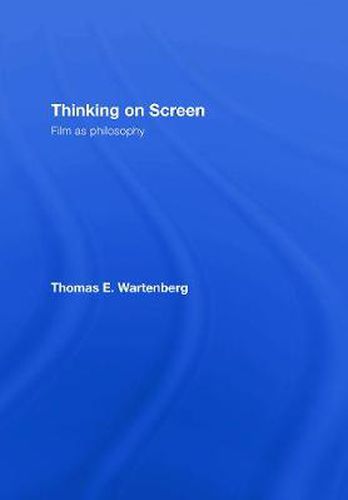Readings Newsletter
Become a Readings Member to make your shopping experience even easier.
Sign in or sign up for free!
You’re not far away from qualifying for FREE standard shipping within Australia
You’ve qualified for FREE standard shipping within Australia
The cart is loading…






Thinking on Screen: Film as Philosophy is an accessible and thought-provoking examination of the way films raise and explore complex philosophical ideas. Written in a clear and engaging style, Thomas Wartenberg examines films’ ability to discuss, and even criticize ideas that have intrigued and puzzled philosophers over the centuries such as the nature of personhood, the basis of morality, and epistemological skepticism.
Beginning with a demonstration of how specific forms of philosophical discourse are presented cinematically, Wartenberg moves on to offer a systematic account of the ways in which specific films undertake the task of philosophy. Focusing on the films The Man Who Shot Liberty Valance, Modern Times, The Matrix, Eternal Sunshine of the Spotless Mind, The Third Man, The Flicker, and Empire, Wartenberg shows how these films express meaningful and pertinent philosophical ideas.
This book is essential reading for students of philosophy with an interest in film, aesthetics, and film theory. It will also be of interest to film enthusiasts intrigued by the philosophical implications of film.
$9.00 standard shipping within Australia
FREE standard shipping within Australia for orders over $100.00
Express & International shipping calculated at checkout
Stock availability can be subject to change without notice. We recommend calling the shop or contacting our online team to check availability of low stock items. Please see our Shopping Online page for more details.
Thinking on Screen: Film as Philosophy is an accessible and thought-provoking examination of the way films raise and explore complex philosophical ideas. Written in a clear and engaging style, Thomas Wartenberg examines films’ ability to discuss, and even criticize ideas that have intrigued and puzzled philosophers over the centuries such as the nature of personhood, the basis of morality, and epistemological skepticism.
Beginning with a demonstration of how specific forms of philosophical discourse are presented cinematically, Wartenberg moves on to offer a systematic account of the ways in which specific films undertake the task of philosophy. Focusing on the films The Man Who Shot Liberty Valance, Modern Times, The Matrix, Eternal Sunshine of the Spotless Mind, The Third Man, The Flicker, and Empire, Wartenberg shows how these films express meaningful and pertinent philosophical ideas.
This book is essential reading for students of philosophy with an interest in film, aesthetics, and film theory. It will also be of interest to film enthusiasts intrigued by the philosophical implications of film.